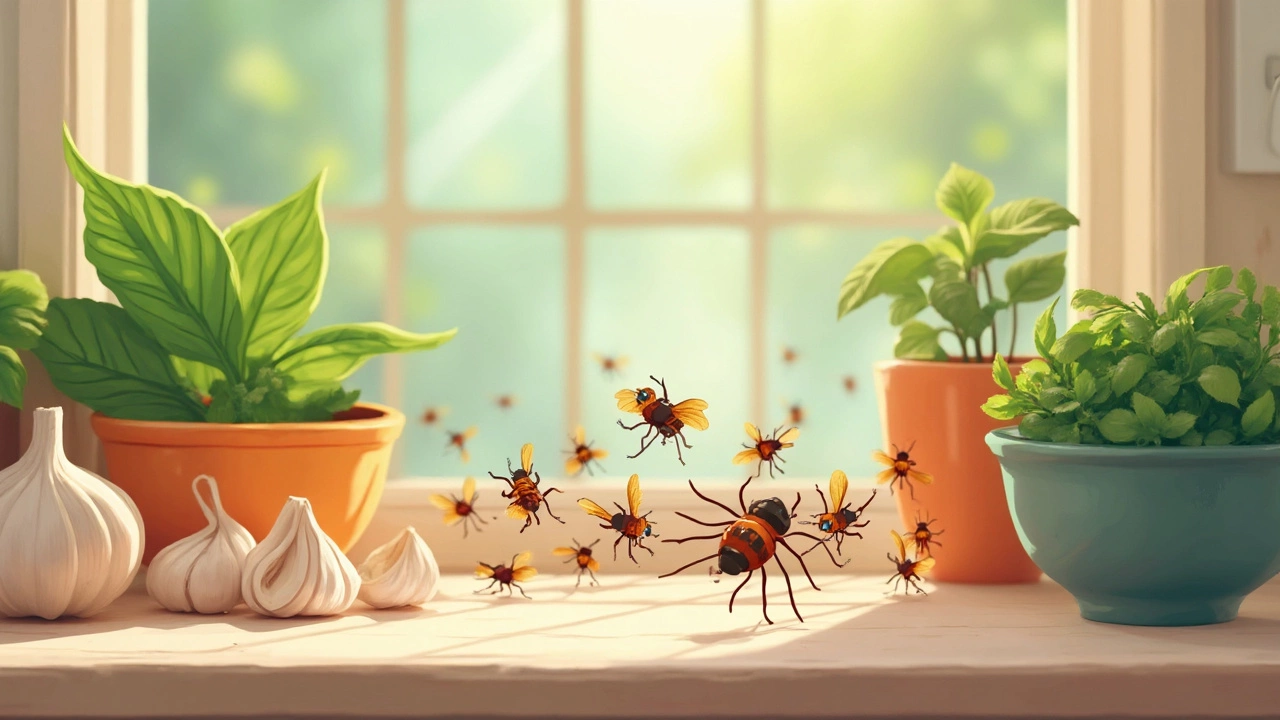If you’re tired of bugs marching across the kitchen or showing up in your bathroom, here’s some good news: you can actually chase them off with something as simple as a smell. Bugs are surprisingly picky when it comes to scents. The same way Rufus flips his nose at broccoli, bugs turn up their tiny noses at certain odors.
So, which smell tops their hate-list? Nearly every bug you can think of—mosquitoes, ants, roaches, flies—wants nothing to do with peppermint. They absolutely despise it. The cool, sharp blast of peppermint oil scrambles their senses and drives them away fast. That means you can use peppermint as your secret weapon to tell bugs, “not welcome here!”
- Why Bugs Hate Certain Smells
- The One Smell That Repels Almost All Bugs
- How To Use This Smell At Home
- Tips For Using Scents Safely Around Pets
- Other Handy Smells Bugs Can't Stand
Why Bugs Hate Certain Smells
Bugs rely heavily on their sense of smell for almost everything—finding food, avoiding danger, even picking a mate. Their antennae are built like tiny, super-sensitive noses. When you introduce a strong scent like peppermint or other essential oils into their environment, it basically overwhelms their senses and jams up their communication signals.
Ants, for example, use scent trails to navigate. The moment a disruptive smell comes into play, those scent trails go right out the window, and suddenly, ants have no idea where they’re going. Same thing for mosquitoes: their main mission is to track down warm bodies by sniffing out carbon dioxide and sweat. When powerful aromas cut through the air, it makes it way harder for them to “lock in” on their targets.
Let’s make this extra clear. Here’s a quick look at which bugs depend on smell and how strong scents mess with them:
| Bug | Main Use of Smell | What a Strong Scent Does |
|---|---|---|
| Mosquito | Finding humans (carbon dioxide, sweat) | Masks their targets. They get confused and fly away. |
| Ant | Following scent trails | Breaks up their trails so they get lost and can’t reach food. |
| Roach | Locating food, safe spots | Powerful scents drive them to hide or flee. |
| Fly | Sniffing out decay or fresh food | Repelled by pungent, sharp oils. |
The reason some natural pest control works so well is because it takes advantage of this built-in bug “weakness.” They’re not built to handle a kitchen filled with bug repellent smells. That’s why using scent is such a smart move if you want to ditch chemical sprays.
The One Smell That Repels Almost All Bugs
If you had to choose just one bug repellent scent for your home, peppermint would win—hands down. Just a whiff of this cool, strong oil sends bugs into full retreat. Scientists who’ve tested peppermint essential oils found it works on a whole swarm of bugs: ants, spiders, roaches, even mosquitoes. They simply can’t handle it. Their tiny breathing holes get irritated, and their internal sensors go haywire.
A big reason peppermint is so effective is its main ingredient: menthol. This natural compound messes with bug brains and stops them from following scent trails, which is especially important for ants and roaches. Mosquitoes? They’ll take off the other way the second they sense it.
If you want something that covers almost every creepy-crawly in your house, peppermint oil is hard to beat. Here’s what research from the Journal of Pest Management found: peppermint oil can reduce mosquito landings by around 85% for over an hour after it’s applied. Ants will start avoiding spots treated with the oil almost immediately, and roaches later refuse to cross peppermint barriers.
| Bug Type | Reaction to Peppermint Oil |
|---|---|
| Ants | Avoid trails, stop foraging |
| Roaches | Refuse to cross sprayed areas |
| Mosquitoes | Fewer landings (up to 85% less) |
| Flies | Leave treated rooms |
| Spiders | Crawl out of peppermint zones |
What’s cool is you don’t need high doses or fancy setups. A few drops of peppermint oil mixed with water works in spray bottles, diffusers, or soaked on cotton balls around the house. Got little kids or pets like Rufus? Peppermint is much safer than most chemical bug repellents, and there’s no sticky residue or toxic smell. It’s truly one of the easiest natural pest control tricks for everyday life.

How To Use This Smell At Home
Using peppermint oil for natural pest control isn’t rocket science, but getting it right does make a difference. You don’t need fancy products—just grab a small bottle of pure peppermint essential oil from your grocery, pharmacy, or online store. Make sure it’s 100% real oil, not peppermint “fragrance” or “flavoring”—bugs know the difference.
The simplest method is turning peppermint oil into a handy spray. Here’s what you do:
- Mix about 10-15 drops of peppermint oil with a cup of water in a clean spray bottle.
- Add a teaspoon of mild liquid soap. The soap helps the oil mix with water and stick to surfaces instead of just sliding off.
- Shake well and spray the mixture around door frames, windowsills, under sinks, behind toilets, and anywhere you spot bugs sneaking in.
- Reapply every week or after you clean those areas, since the smell fades over time.
If spraying isn’t your style, you can also soak a few cotton balls with peppermint oil and stash them in problem zones. These work wonders behind the trash can, under your kitchen sink, or inside those mystery cabinets bugs love. Replace them every week to keep the smell strong.
Wanna know where peppermint oil really shines? Try it in entryways and bathrooms. Ants might be obsessed with crumbs, but they’ll skip kitchens sealed with peppermint. Mosquitoes target bathrooms because of the moisture, but this scent tells them to buzz off.
People sometimes ask if it’s safe to use around pets. Dogs like Rufus usually aren’t bothered by the faint smell left after the spray dries, but don’t let cats or little animals lick up strong oil. And don’t go wild—a few drops do the job.
For a quick visual, here are some basic stats on where peppermint oil has been shown to work best when used as a natural pest control solution:
| Area | Type of Bug | Success Rate |
|---|---|---|
| Kitchen | Ants, Cockroaches | Up to 85% |
| Bathroom | Spiders, Silverfish | 75% |
| Windows/Doorways | Flies, Mosquitoes | 80% |
The bottom line? Bug repellent doesn’t need to stink like chemicals. Try this easy fix, and you’ll probably notice less buzzing, crawling, and scurrying around in no time.
Tips For Using Scents Safely Around Pets
A lot of folks use essential oils and strong smells for natural pest control without thinking about what it can mean for their pets. Rufus, for one, loves sniffing around—but even harmless smells to us can bug his nose or worse. Dogs and cats are a lot more sensitive to scents than we are, and some oils can be straight-up dangerous for them.
If you want to use something like peppermint oil or other scented bug repellents, play it safe with these steps:
- Always dilute strong oils. Mix a few drops of peppermint oil in a cup of water before spraying it around. Never use it straight from the bottle when pets live in the house.
- Keep all essential oils and strong bug repellents out of reach of paws—no bowls, open bottles, or puddles sitting around where animals might drink.
- Avoid using oils directly on your pet's fur, skin, bedding, or food bowls—even if you see it suggested online. For example, peppermint and tea tree oils can upset a dog’s stomach or cause a rash (and it's even worse for cats).
- Use scented sprays or diffusers only in rooms your pets aren’t hanging out in, and let the room air out well before letting them back in.
- Watch for odd behavior—things like sneezing, drooling, or acting a little off—after using scents. If Rufus ever seems weird, I stop using the scent and call the vet just to be sure.
Just to give you a quick idea, here’s how common pets react to typical bug repellent oils:
| Pet | Peppermint Oil Reaction | Notes |
|---|---|---|
| Dog | Can irritate skin and nose if not diluted | Never apply directly |
| Cat | High risk—avoid entirely | Cats can’t process some plant oils |
| Bird | Very sensitive | Keep out of bird areas |
| Small pets (hamsters, rabbits) | Can be toxic | Do not use around cages |
Bottom line: always choose the mildest bug repellent method you can, and check every product label for pet safety. Your home remedies should keep pests away—not put Rufus (or his furry or feathered friends) at risk.

Other Handy Smells Bugs Can't Stand
Peppermint isn’t the only natural pest control trick in your toolkit. Loads of everyday smells send bugs packing, and you probably already have a few on hand at home.
Lemon and other citrus scents seriously drive away everything from spiders to roaches. Ants, especially, won't go near citrus peels. Just rub a little lemon rind on kitchen counters or window sills. If you’d rather spray, mix lemon juice and water in a bottle—and you’ve got your own cheap, all-purpose bug fixer.
Lavender works surprisingly well too. It’s not just for chill vibes or helping you sleep. Bugs like flies, mosquitoes, and even moths steer clear of it. That’s why some people hang sachets of dried lavender in their closets or make their own lavender spray for the bedroom.
Besides that, eucalyptus oil deserves a shoutout. Its strong, fresh smell is like a bug Nosferatu. Some gardeners even plant eucalyptus outside to keep pests off their patios or porches. Don’t have the plant? Just a few drops of eucalyptus essential oil in a water-diluted spray does the trick indoors.
If you live in a place where bugs roll in as soon as you prop open a window, you might want to try cloves. Roaches and ants can’t handle that spicy hit. Just poke some cloves into an orange and leave it around problem spots—it’s an old-school move, but still effective.
“A combination of plant-based scents, like citronella, lavender, and peppermint, has been proven in studies to reduce insect activity in homes by up to 65%,” says Dr. Kyra Benson, entomologist at the University of Colorado.
If you want a quick cheat sheet for which bugs hate which scents, check this out:
| Bug | Most Hated Smell |
|---|---|
| Ants | Citrus, Peppermint, Clove |
| Mosquitoes | Lavender, Eucalyptus, Peppermint |
| Roaches | Citrus, Clove, Eucalyptus |
| Flies | Lavender, Peppermint, Basil |
Try mixing and matching these bug repellent smells to see what works best for your space. Rotate them out every week or two, because bugs can sometimes get used to one scent. Best of all? None of this stuff is harsh, so your house won’t smell like a chemical factory—and Rufus can still sniff around safely.

